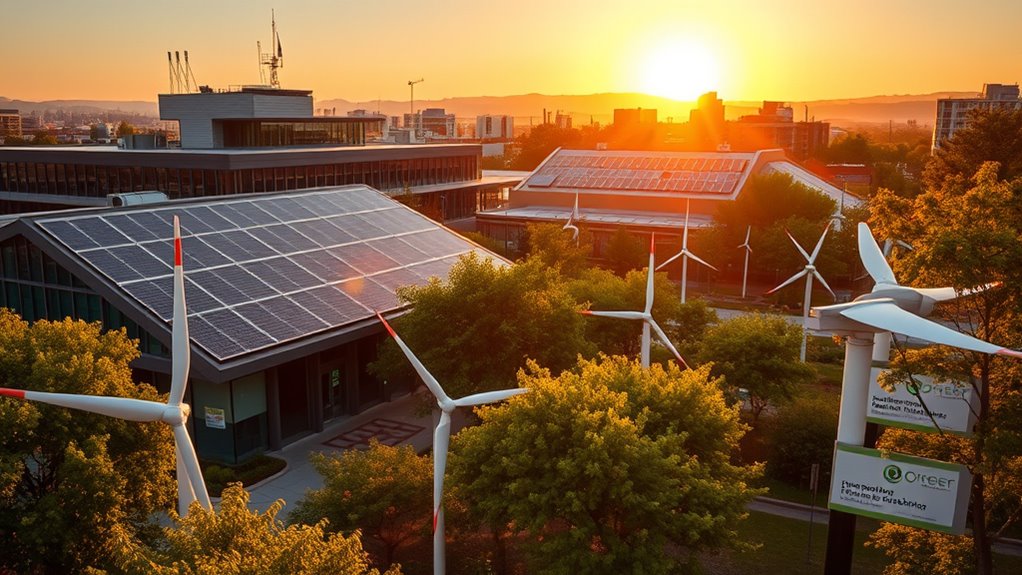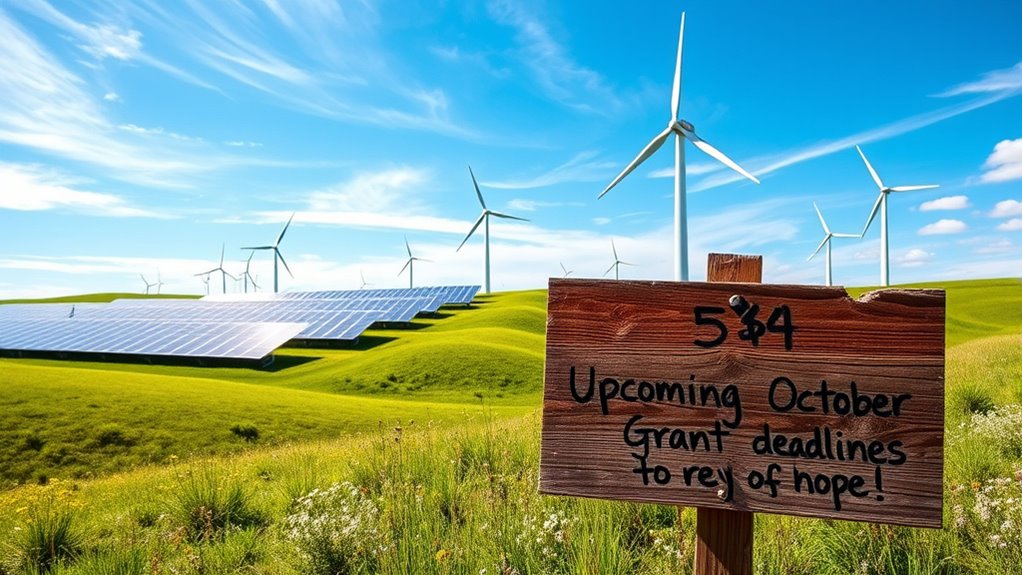If you’re seeking renewable energy grants with October deadlines, you’ll find options at federal, state, local, and private levels. Federal programs include clean energy development support with tax credits and incentives, while states offer rebates and subsidies tailored to regional resources. Private foundations fund innovative projects, and local governments present community-focused incentives. By exploring these opportunities, you can maximize your project’s chances of success. Keep exploring, and you’ll uncover key strategies to enhance your application and secure funding.
Key Takeaways
- Many federal, state, and private foundation renewable energy grants have application deadlines in October.
- Applicants need to prepare detailed project plans, budgets, and community impact statements before October deadlines.
- Local government incentives and grants often require compliance and strategic proposals submitted by October.
- Attending pre-application workshops in late September can enhance chances of securing October grants.
- Timely submission and thorough documentation are critical to meet October deadlines and maximize funding opportunities.
Federal Grant Opportunities for Renewable Energy Projects

Are you looking for funding options to jump-start your renewable energy project? Federal grant opportunities can be a great starting point, especially with supportive solar policies that encourage clean energy development. These grants often align with federal initiatives aimed at reducing carbon emissions and promoting renewable sources like solar and wind. Additionally, federal programs frequently incorporate benefits like renewable tax credits, which can considerably lower your project’s overall costs. To maximize your chances, stay informed about upcoming deadlines and specific eligibility requirements. Applying early and providing detailed, well-documented proposals can make a big difference. Federal grants not only provide financial support but also lend credibility, helping you leverage additional funding from private investors or state programs. Incorporating sound design techniques strategies can also help diversify your investment portfolio as you fund renewable projects. Understanding the ancient utilization of seeds can inspire innovative approaches to sustainable resource management in your projects. Staying aware of the signs of spoilage in materials or supplies used in your project can also help ensure safety and quality throughout your development process.
State-Specific Renewable Energy Funding Programs

Looking to secure funding tailored to your state’s renewable energy goals? State-specific renewable energy funding programs can provide the support you need. Many states offer solar incentives that reduce installation costs or provide rebates for solar panel systems. These incentives make switching to solar more affordable and accessible. Additionally, wind subsidies are available in regions with suitable wind resources, helping offset project development costs. Check your state’s energy department or public utility commission for detailed information on available grants and rebates. These programs often have October deadlines, so acting quickly is essential. By leveraging state-specific funding options, you can maximize your renewable energy investments while supporting local sustainability efforts. Understanding the refrigeration cycle can also help you make more energy-efficient choices for your home. Staying informed about pest management strategies can protect your renewable energy infrastructure from potential damage. Incorporating energy-efficient appliances can further reduce your overall energy consumption and enhance the effectiveness of your renewable projects. Additionally, considering home insulation improvements can significantly lower heating and cooling demands, making your renewable energy systems more effective and saving you more money. Being aware of grid integration processes can help ensure your renewable systems operate smoothly within your local energy network. Ensure your projects meet all criteria for funding approval.
Private Foundation Grants Supporting Clean Energy Initiatives

Private foundations increasingly support clean energy initiatives by offering grants that fund innovative projects and research. These grants often target areas like solar innovation, helping develop more efficient solar panels and harvesting techniques. If you’re working on advancing energy efficiency, many foundations are enthusiastic to fund your efforts to optimize systems and reduce waste. They focus on transformational ideas that can reshape the energy landscape, making renewable options more accessible and affordable. Grants from private foundations can cover equipment, research costs, and pilot programs, giving you the resources needed to push your projects forward. Additionally, recognizing the importance of the Big Island, HI as a unique location for sustainable energy solutions, some grants may prioritize projects that leverage local ecosystems and volcanic landscapes. By applying now, you can tap into these funding opportunities before October deadlines close, accelerating your sustainable energy efforts and making a positive environmental impact.
Local Government Incentives and Grants

Local governments offer a variety of incentives and grants to support renewable energy projects, but eligibility criteria can vary widely. You should familiarize yourself with the application procedures to guarantee your project qualifies and submits a strong proposal. These grants can notably benefit your initiatives by reducing costs and increasing community impact. Additionally, understanding fundraising strategies and leveraging digital platforms can enhance your chances of securing these private and public funding sources. Developing self-awareness about your project’s strengths can further improve your grant applications.
Funding Eligibility Criteria
Ever wondered if your project qualifies for local government incentives and grants? To determine eligibility, you need to meet specific requirements and follow application guidelines. Typically, eligibility includes being a registered entity or municipality, demonstrating a clear renewable energy plan, and adhering to local regulations. Your project might also need to align with community goals like reducing emissions or increasing sustainability. Additionally, reviewing site requirements and ensuring compliance can streamline the application process. Incorporating mindfulness techniques into project planning can also help manage stress and improve focus throughout the application process. Being aware of application timing can maximize your chances of securing funding. Understanding performance metrics used to evaluate projects can also enhance your application’s competitiveness. Familiarity with funding priorities ensures your project aligns with what grant programs emphasize. Here’s a quick overview:
| Eligibility Requirements | Application Guidelines |
|---|---|
| Registered municipality or entity | Submit detailed project plan |
| Alignment with local policies | Provide financial documentation |
| Meet environmental standards | Follow deadline and submission process |
| Demonstrate community benefits | Include all necessary supporting docs |
Review these criteria carefully to ensure your project qualifies for funding.
Application Procedures Overview
Once you’ve confirmed your project meets the eligibility criteria, understanding the application process is the next step. Start with proposal writing—craft a clear, detailed plan that highlights your project’s goals, timeline, and expected outcomes. Be sure to follow the grant guidelines closely, addressing all required sections. Budget planning is equally important; prepare a realistic budget that justifies each expense and aligns with grant limits. Organize your financial documents carefully to demonstrate responsible use of funds. Submit your application before the October deadline, ensuring all components are complete and error-free. Keep copies of your submission for reference. A well-prepared proposal, combined with thorough budget planning, increases your chances of securing local government incentives or grants for your renewable energy project.
Grant Benefits and Impact
Are you aware of how much local government incentives and grants can boost your renewable energy project? These grants can markedly enhance your project’s renewable benefits and demonstrate substantial grant impact. Here’s how:
- Financial Savings: Reduce upfront costs and improve your project’s return on investment.
- Accelerated Development: Speed up project timelines with accessible funding resources.
- Community Benefits: Promote local sustainability, create jobs, and boost public support.
- Additionally, understanding Vetted – Halloween Product Reviews can provide insights into how to effectively promote and showcase your renewable energy initiatives during seasonal campaigns.
- Incorporating renewable energy grants into your financial planning can also help optimize your investment strategies and ensure sustainable growth. A thorough knowledge of funding opportunities can further amplify your project’s success and outreach, especially as angel number soulmate patterns can symbolize alignment and favorable connections in your endeavors. Knowing about family photoshoot fails can also help you anticipate and manage unexpected challenges that may arise during project implementation.
Industry-Specific Renewable Energy Funding Options

Many industries have dedicated incentive programs that can help fund your renewable energy projects. Sector-specific grants are tailored to meet the unique needs of each industry, making them a valuable resource. Exploring these options can considerably boost your efforts toward sustainable energy adoption.
Industry Incentive Programs
Have you explored the various industry-specific renewable energy funding options available to help your business shift to cleaner energy sources? Industry incentive programs are tailored to boost your efforts in areas like solar innovation and wind development. These programs often include:
- Grants for implementing advanced solar technologies or expanding wind farms
- Tax credits that incentivize investments in renewable infrastructure
- Performance-based incentives rewarding measurable reductions in emissions
Sector-Specific Grants
Sector-specific grants target particular industries, providing tailored funding options to accelerate your shift to renewable energy. These grants focus on sectors like manufacturing, agriculture, or transportation, offering benefits such as solar incentives and wind subsidies. By applying for industry-specific programs, you can maximize your funding potential and reduce upfront costs. Some grants prioritize renewable energy projects that integrate solar panels or wind turbines, helping you lower energy bills and meet sustainability goals. The table below highlights key sectors and relevant incentives:
| Sector | Incentives Offered |
|---|---|
| Manufacturing | Solar incentives |
| Agriculture | Wind subsidies |
| Transportation | Solar and wind grants |
| Commercial | Tailored renewable grants |
How to Prepare a Winning Grant Application

To increase your chances of securing a renewable energy grant, you need to craft a clear and compelling application that directly addresses the funding criteria. Focus on demonstrating your project’s potential for technology innovations and community engagement. Here’s how:
- Clearly outline your project goals, emphasizing innovative solutions that advance renewable tech.
- Showcase your plan for engaging the community, highlighting partnerships and outreach efforts.
- Provide detailed budgets and timelines, ensuring your project’s feasibility and sustainability.
Be concise and specific, using data and examples to back your claims. Tailor your application to align with the grant’s priorities, making it easy for reviewers to see your project’s value and impact. A focused, well-organized application will set you apart.
Key Deadlines and Important Dates to Remember

Staying on top of key deadlines and important dates is essential for submitting a successful renewable energy grant application. Mark the submission deadline for renewable integration projects, which typically falls in early October, to guarantee your proposal is submitted on time. Be aware of any pre-application workshops or informational sessions scheduled in late September—they can provide valuable insights. If your project involves energy storage, note any deadlines for supplementary documentation or technical specifications. Keep track of review periods, which usually span from mid-October to early November, so you can prepare for follow-up requests. Missing these dates could delay your project’s progress or disqualify your application altogether. Staying organized and attentive to these critical dates keeps your renewable energy project on track for funding success.
Tips for Maximizing Your Chances of Securing Funding

Securing renewable energy funding requires strategic planning and careful preparation. To boost your chances, focus on these key areas:
- Match funding strategies by aligning your project with funders’ priorities and demonstrating how your initiative complements their goals.
- Follow proposal writing tips like clear, concise language, solid data, and a compelling narrative that highlights your project’s impact.
- Prepare detailed budgets and timelines to show feasibility and accountability, making it easier for reviewers to assess your project’s viability.
Frequently Asked Questions
Which Renewable Energy Technologies Are Most Likely to Receive Funding?
You’re likely to see funding favor solar innovations and wind advancements because these technologies lead renewable energy progress. Grants often prioritize projects that improve efficiency, reduce costs, and expand capacity in these areas. By focusing on cutting-edge solar and wind solutions, you can strengthen your chances of securing funding. Keep an eye on emerging technologies within these sectors, as they’re most attractive to grant providers aiming for impactful, scalable renewable energy solutions.
Are There Any Eligibility Restrictions Based on Project Size or Location?
You should check for project size limitations and geographic eligibility before applying. Many grants set specific project size restrictions, often favoring small or community-scale projects, while others target larger initiatives. Geographic eligibility varies, with some programs focusing on certain regions or states. To guarantee your project qualifies, review the specific grant guidelines carefully, focusing on any size or location restrictions that could impact your application’s success.
How Competitive Are Renewable Energy Grants Typically?
You’ll find renewable energy grants often quite competitive, especially when applying for solar incentives or wind subsidies. Many applicants vie for limited funds, so having a strong project proposal, clear environmental benefits, and local support can boost your chances. Staying informed about deadlines and criteria helps you stand out. While competition can be stiff, a well-prepared application that highlights your project’s impact and efficiency can increase your odds of success.
Can Non-Profit Organizations Apply for These Grants?
You can absolutely apply for renewable energy grants if you’re a nonprofit organization. To strengthen your application, focus on grant application tips like clearly outlining your project’s impact and sustainability. Incorporate nonprofit funding strategies such as demonstrating community support and aligning your goals with funder priorities. Being thorough and strategic increases your chances of securing funding, so prioritize these elements to stand out in competitive grant processes.
What Are Common Reasons for Grant Application Rejections?
When you apply for grants, rejection often stems from weak grant writing strategies or a flawed application review process. You might miss key requirements, fail to clearly demonstrate your project’s impact, or overlook deadlines. To improve your chances, focus on understanding the review criteria, tailor your proposal to the funder’s priorities, and guarantee your application is clear, concise, and compelling. These steps can help your application stand out and reduce rejection risks.
Conclusion
Don’t delay—dive into diverse deadlines and discover dynamic funding opportunities. By staying savvy, strategic, and specific, you’ll strengthen your chances of securing significant support. Remember, timely tips and thorough preparation turn promising proposals into powerful, profit-producing projects. Keep keen on key deadlines and don’t be afraid to ask for assistance. With determination and diligence, you’ll dominate the domain of dedicated, deserving renewable energy grants this October and beyond.










